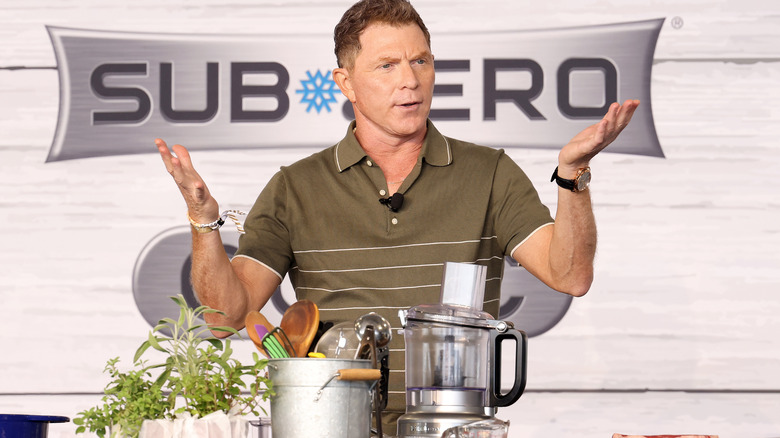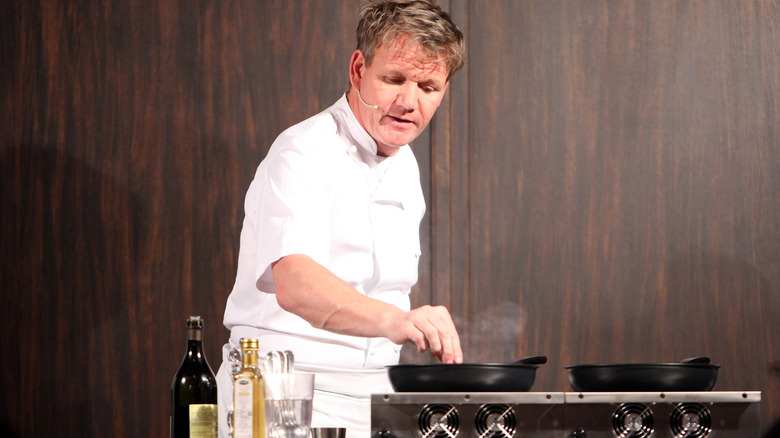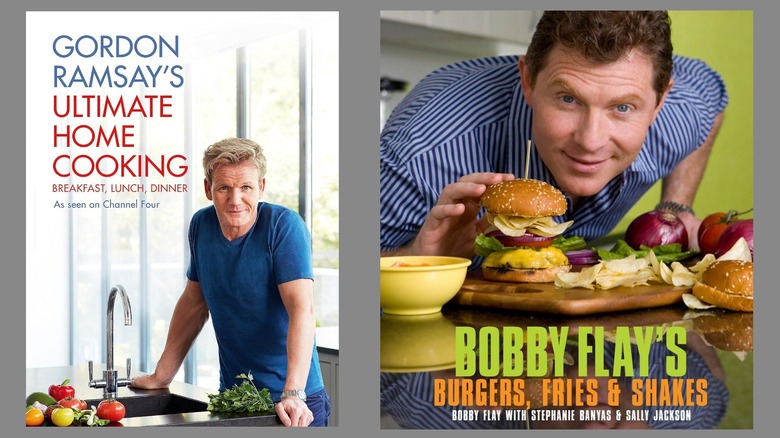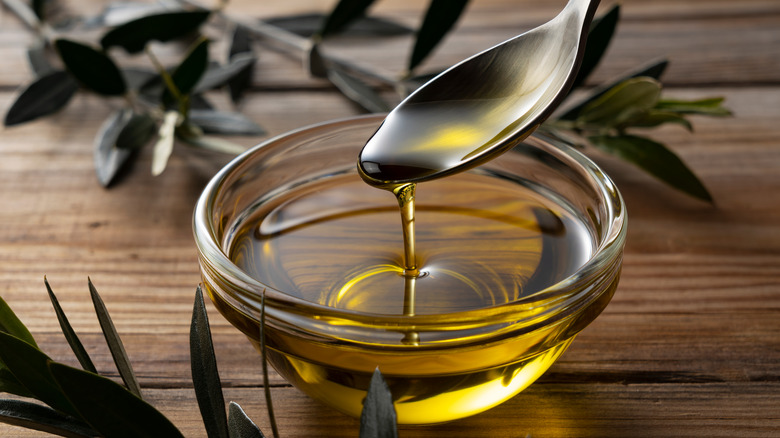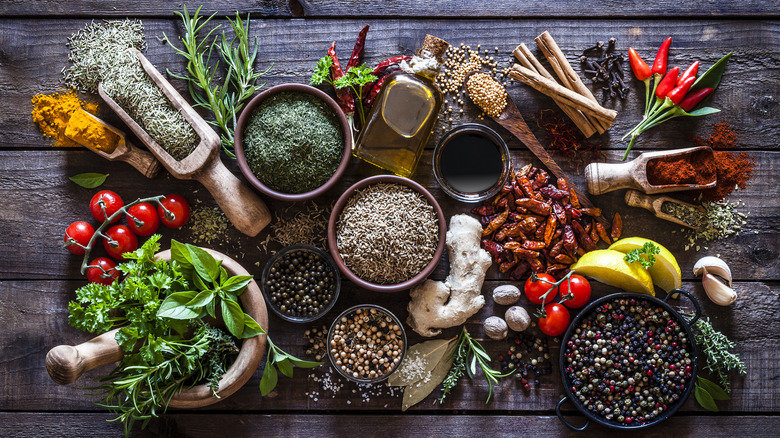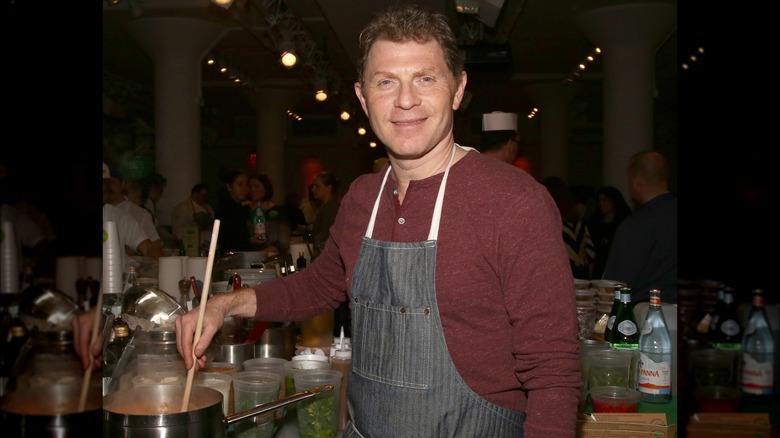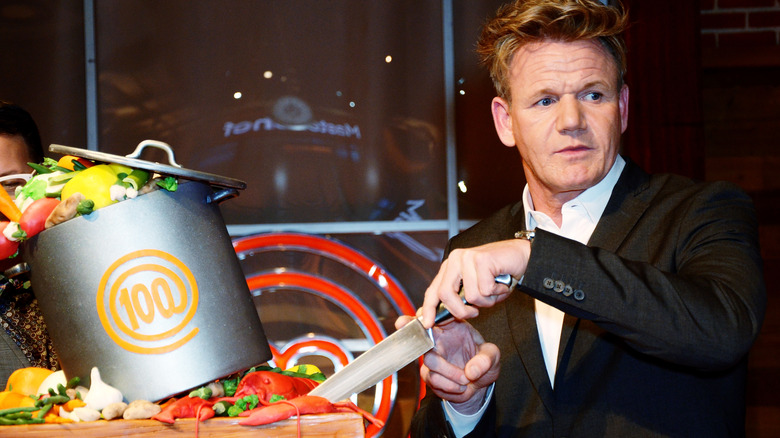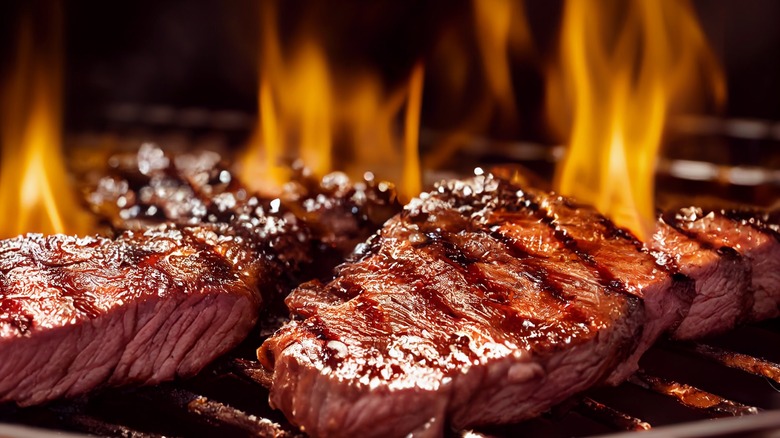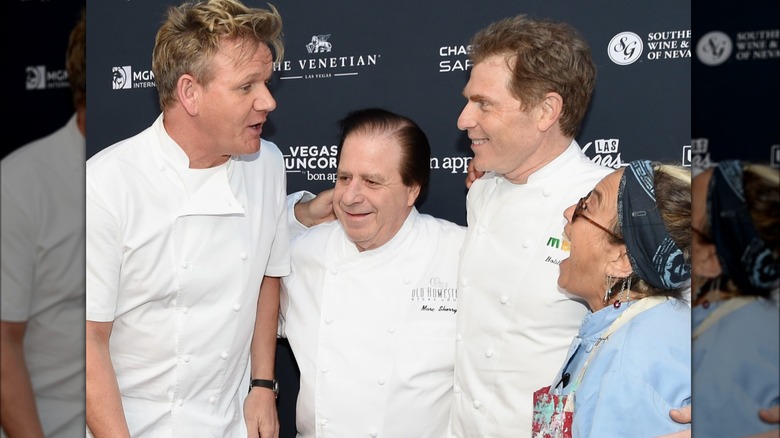Bobby Flay's Cooking Style Vs. Gordon Ramsay's: Everything You Need To Know
We may receive a commission on purchases made from links.
They're two of the most recognized TV chefs in the game: Bobby Flay and Gordon Ramsay. Whether you're watching Flay smash the competition on his self-named reality cooking series "Beat Bobby Flay" or holding your breath as Ramsay tears into a negligent chef on "Kitchen Nightmares," you're in for an impressive display of culinary knowledge and mastery.
And with fan bases as large as the ones these powerhouse chefs have amassed over the years in the spotlight, comparisons and contrasts between the two of them on platforms such as Reddit and Quora pop up like wildfire. One doesn't have to look far to find a number of these online debates, displaying titles such as "Gordon Ramsay vs Bobby Flay, who would cook the best meal?" The opinionated discussions posed by users on these threads can get remarkably heated. But before you declare the superiority of one of these chefs over the other in the midst of your next verbal or online battle, be sure to take into account each man's approaches and techniques in the kitchen. Here's everything you need to know about the similarities and the differences between the cooking styles of Flay and Ramsay.
While Flay was classically trained, Ramsay went straight to working in kitchens
When it comes down to it, which is a more significant step on the path to superior skill development: formal training or raw experience? It's a fiercely debated question, and interestingly enough, chefs Gordon Ramsay and Bobby Flay stand as perfect representations on both sides of the discourse.
Flay graduated from culinary school in 1984, having received a classical cooking education from the world-famous French Culinary Institute in New York. He has said that it was there that he learned the basic French techniques that changed his life. Ramsay, on the other hand, did not attend any culinary school. While the world-renowned chef did get a diploma from a technical college in 1987, it was in hotel management, not in flavor pairings or slicing techniques. This knowledge came later, after the young Ramsay started working in a kitchen under chef Marco Pierre White — the first of multiple cooking masters who would help train him and shape his skills through good old-fashioned watching and learning.
While both men's culinary paths hold merit, this difference in background has allowed their individual skills to blossom uniquely, contributing to the notable way in which they both cut, season, and create in the kitchen.
Flay's specialty is Southwestern cuisine, while Ramsay's is classic European
Just as Bobby Flay and Gordon Ramsay have different educational backgrounds under their belts, so too do they have separate specialties influenced by their unique training and experiences as well as the countries where they grew up.
Born and raised in the United States, Flay has a flair for American Southwestern cooking, particularly Mexican dishes, which he fell in love with while working for restaurateur Jonathan Waxman. Flay is also known for whipping up juicy slabs of meat on the barbecue. Conversely, when it comes to Ramsay — who was born in Scotland and raised in England — his own expertise tends to be found in the realm of traditional, continental European and French cuisine. That makes sense when you consider the chefs whom Ramsay was trained under. Albert Roux and Marco Pierre White in London as well as Guy Savoy and Joël Robuchon in France were Ramsay's self-proclaimed greatest influencers and teachers. All four are renowned masters in classic European dishes.
While we're confident that the talented Flay or Ramsay could hold their own in nearly any genre of cooking, these particular areas of comfort and skill are a direct result of their distinct life experiences and are worthy of note.
Flay embraces innovation, while Ramsay prefers more traditional pairings
When considering the kitchen creations developed by the two celebrity chefs, a pattern emerges. Bobby Flay seems to prefer putting his own unique spin on recipes, bringing in unorthodox flavors and spices from around the world to create interesting culinary mash-ups, while Gordon Ramsay tends to go for more classic pairings.
Take Flay's signature Tandoori-style Chicken Taco recipe, for example, which brings in a fiery slew of Indian meat and spices to a traditionally Mexican-style dish. Or his Corn Cacio e Pepe Pasta recipe, in which he himself admits in a Misfits Market clip on YouTube: "I'm really messing with tradition a little bit" when describing his choice to add sweet corn kernels to an otherwise classic pasta dish. When it comes to Ramsay, on the other hand, you may not see as many examples of him pushing the culinary flavor envelope, but you will find an unmatched mastery of traditional recipes. His classic, succulent beef Wellington recipe, for example, is consistently considered to be one of his best as is his beef stroganoff and chicken piccata creations.
We can likely all agree that both innovation and tradition hold importance in the kitchen; and the two chefs in question certainly bring these aspects to the table seamlessly.
Flay's recipes often feel more accessible to home cooks, while Ramsay's tend to be demanding
Gordon Ramsay and Bobby Flay are both successful authors with multiple cookbooks to their credit. This has allowed everyday home cooks to access their banks of recipes, making it possible for their celebrated bites to be sampled at tables all over the world. However, there are some notable differences to be found in the chefs' outlined procedures. While Flay's recipes generally feel easygoing and attainable, Ramsay's are often notorious for being technically challenging. Flay's calm and cool demeanor on display during his many televised cooking challenges is well-observed. So too are Ramsay's passionate outbursts in the midst of his broadcasted restaurant-turnarounds. These distinctions in their natures often seem to shine through in the written recipes found on the pages of their cookbooks.
Because of this, the less experienced home cook may want to opt for one of Flay's cookbooks. His recipes generally include clear instructions as well as helpful explanations breaking down how to make from-scratch ingredients that might make the novice feel more at ease in the kitchen. Ramsay's recipes, on the other hand, might be a better fit for the seasoned home chef already knowledgeable in basic methods. There is typically less explanation included in his recipes as well as the use of relatively demanding tactics — so reach for a Ramsay cookbook when seeking a challenge.
Ramsay often uses olive oil when cooking, while Flay prefers something lighter
Cooking oil is one of the most important ingredients a chef can have on hand. When it comes to one of the most popular variants — olive oil — both Gordon Ramsay and Bobby Flay differ in how it should be used in the kitchen.
Flay explains via his cooking tips on the Food Network that a high quality extra-virgin olive oil should always be kept on hand ... but used only for drizzling prior to serving. The golden ingredient, he argues, is much too heavy for cooking itself, so a lighter type of oil should be used within the body of a recipe. His oil of choice? Canola oil.
Ramsay, on the other hand, has a different preference when cooking. Whether it be the base of a dressing,a coating for potatoes, or the frying oil in a pan, olive oil is considered a star ingredient when Ramsay's crafting food. His love of the stuff is so well-known that it resulted in a YouTube video titled, "Gordon Ramsay Olive Oil COMPILATION" featuring some memorable clips of the chef using it in numerous ways. Perhaps this is simply matter of taste more than anything, but as it stands, olive oil usage appears to serve as a tangible distinction between the two chefs.
Both have similar mindsets regarding spices
Spices are the backbone of any good dish, and there's a specific tip regarding salt, pepper, and the like that star chefs Bobby Flay and Gordon Ramsay can shake hands on: keeping those granulated herbs and spices you sprinkle on your food fresh is absolutely essential to maintaining the taste, quality, and integrity of your dish.
Both Flay and Ramsay hold similar mindsets regarding old pantry spices, advising that they should be changed out fairly regularly. Ramsay recommends getting new spices every 12 months, while Flay advises you to replace them around the same time you swap out the batteries in your smoke alarms. Because of this, bulk spice purchases (such as the giant tubs found in the aisles of wholesalers like Costco) may not be the best choice for the standard home chef, as their freshness will likely begin to diminish before the purchaser can work their way through them. Sounds like the smaller spice containers are the way to go ... if you're taking the words of these two star-studded cooking professionals at face value, that is.
Flay enjoys improvisation, while Ramsay thrives on execution
Anyone who's ever seen Bobby Flay craft the perfect dish in a short amount of time on his high-stakes competition show "Beat Bobby Flay" has witnessed his undeniable creativity and mastery of cooking under stress. Flay comes off as a flexible chef who seems to enjoy, maybe even shine, when cooking on the fly. His fellow celebrity kitchen star Gordon Ramsay, however, seems to have a more exacting skill set. Many of Ramsay's fans note that the Michelin-studded chef seems to shine when crafting familiar dishes, creating full menu pairings, and applying classic execution in the kitchen rather than cooking spontaneously.
When asked on Quora which celebrity chef would win a cookoff, restaurateur and cookbook author Ross Boardman responded: "In a competition where they cooked a signature menu then Gordon. For anything where there is improvisation, then Bobby. For something where it's a known recipe but with random ingredients then either of them."
Technical skill and creative ability are to be equally revered in the kitchen, and when mashed together, Ramsay and Flay make for an unmatched pair with the ability to bring both elements of expertise to the table.
Flay smokes brisket the American way, while Ramsay employs a method foreign to many U.S. fans
Ahh, brisket. A savory cut from the chest of a cow, brisket is often regarded as the very best meat for barbecuing since its higher fat percentage makes it a perfect candidate for a long, low cook. Preparing brisket in a smoker is the most typical method for bringing out the meat's impeccable, juicy flavor ... at least it is in the United States. Thus, it is the method employed by New York native Bobby Flay in his brisket recipes. One recipe, for example, calls for a slab of spiced meat to be placed fat-side down inside a smoker and regularly basted for about five hours.
Gordon Ramsay, on the other hand, employs a more European method when crafting brisket, opting to place the meat in the oven at low heat for about eight hours. The technique has been criticized by some U.S. barbecue fans in online platforms who don't seem to appreciate the unfamiliar approach. But while Flay may be better at connecting with American consumers through his traditional smoked brisket recipes, Ramsay's methods are likely more relatable in those in parts of the world where smokers are employed less often. Either way, we're sure that the brisket takes from both chefs would end up tasting just stellar on your kitchen table — whatever your personal preference regarding the cooking method for good barbecue might be.
You'll see many of the same recipes, but each chef adds his own flair
Similar recipes developed by stars Bobby Flay and Gordon Ramsay over the years have caused inevitable comparisons by home cooks who've prepared both versions. Videos, discussions, and reviews pitting Flay's and Ramsay's fruit salads or grilled steaks against one another are scattered across the internet, with differing opinions on which ones ultimately take the cake. But regardless of which master chef's burger recipe you may personally prefer, one thing is for certain: Each chef will put his own unique spin on the dish.
From the ingredients to the cooking techniques, the recipes often have subtle differences based on the chef's personal style. Take their scrambled eggs, for example. Flay pre-mixes his eggs in a bowl prior to cooking while Ramsay cracks his eggs directly into a hot pan and then constantly stirs them while they cook. Both use crème fraîche in their scrambled eggs, but Flay adds the ingredient along with butter to a hot pan before the eggs, while Ramsay adds the crème fraîche once the eggs are mostly done cooking. When it comes to their signature grilled cheese recipes, Flay's melty sandwich calls for the addition of rich goat cheese, while Ramsay's grilled cheese requires the Korean-inspired addition of kimchi. Whichever recipe you choose to compare alongside its similarly named counterpart, you should always be able to find a chef's individual touch in there somewhere.
They both share an affinity for despising overcooked meat
Getting the perfect sear on a cut of savory steak or a juicy chicken thigh is a must for any good chef, and Gordon Ramsay and Bobby Flay are no exception. Both culinary professionals are sticklers for a melt-in-your-mouth slab of beef. They agree that an overcooked animal protein can completely ruin an otherwise perfect dish. "People are always concerned whether something is cooked enough," Flay told Bon Appétit. "But they're never concerned with whether it's overcooked."
Ramsay expresses his own hatred of overcooked meat in perhaps a slightly less eloquent but more fiery fashion. The most abundant and clear evidence of his disapproval of tough protein comes through in his television appearances, when he's fiercely scolding a negligent cook for presenting a leathery poultry breast or pork round. In fact, his reactions to such infractions are so strong that they resulted in a Quora discussion titled, "Why does it matter so much to Gordon Ramsay if the food is overcooked just ever so slightly?" Could it have something to do with providing quality food?
In an exclusive interview with Tasting Table, Ramsay talked about what makes a great steak: "I can tell you from a mile away whether or not that's been seared properly. If there's white fat that is exposed that hasn't been rendered or it's been over-seared underneath, it'll be gray on the bottom and overcooked. I can tell you how a steak's cooked without touching it."
Both are undeniably passionate about their craft
For all of their similarities, differences, strengths, and weaknesses, there's one fact that simply cannot be denied: Both Bobby Flay and Gordon Ramsay are incredibly talented chefs. Further — and perhaps even more importantly — the two absolutely bleed passion for their craft.
Whether it's Ramsay raising funds for the Gordon Ramsay Academy, a culinary school that helps aspiring professionals and home chefs alike improve their skills, or Flay serving as keynote speaker at various events to inspire the next generation of kitchen creators, the stars' passion for the field to which they've dedicated their lives is plainly evident. Between their television shows, various successful restaurants, and inspired, flavorful dishes, both Flay and Ramsay have made contributions to the culinary world that are indisputable. Given their unique styles and strengths, could they ever truly or fairly be paired against one other ... or is it akin to comparing apples and oranges? We aren't sure, but we think we'll choose to just sit back and enjoy the incredible sights, smells, and tastes of the unforgettable dishes produced by these two culinary masters.

